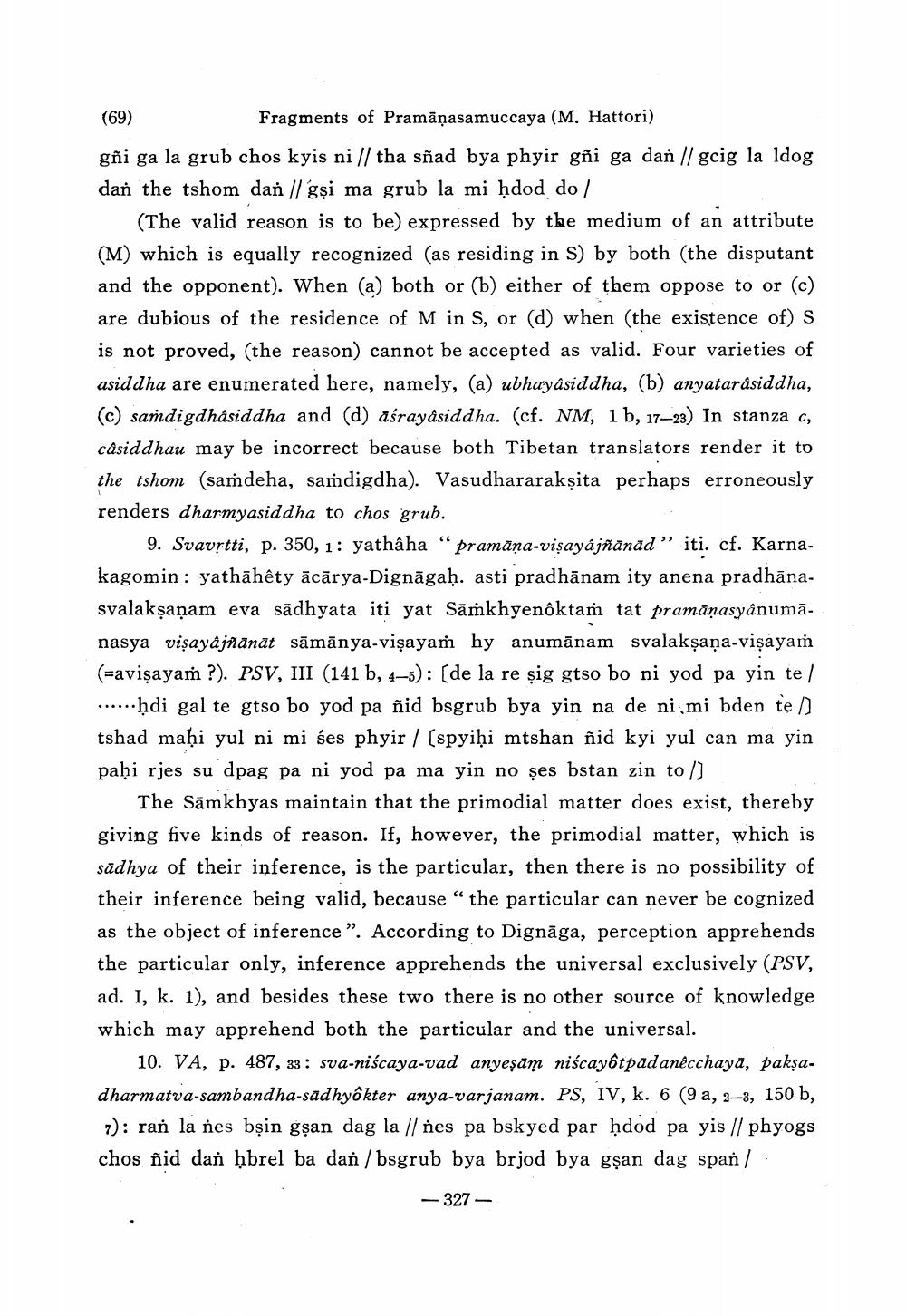Book Title: Fragments Of Pramana Samuccaya Author(s): Massaki Hattori Publisher: Massaki Hattori View full book textPage 4
________________ (69) Fragments of Pramāṇasamuccaya (M. Hattori) gñi ga la grub chos kyis ni // tha sñad bya phyir gñi ga dan // gcig la ldog dan the tshom dan || gși ma grub la mi ḥdod do / (The valid reason is to be) expressed by the medium of an attribute (M) which is equally recognized (as residing in S) by both (the disputant and the opponent). When (a) both or (b) either of them oppose to or (c) are dubious of the residence of M in S, or (d) when (the existence of) s is not proved, the reason) cannot be accepted as valid. Four varieties of asiddha are enumerated here, namely, (a) ubhayâsiddha, (b) anyatarâsiddha, (c) sandigdhäsiddha and (d) aśrayasiddha. (cf. NM, 1 b, 17-23) In stanza c, câsiddhau may be incorrect because both Tibetan translators render it to the tshom (samdeha, samdigdha). Vasudhararakṣita perhaps erroneously renders dharmyasiddha to chos grub. 9. Svavrtti, p. 350, 1: yathaha “pramāņa-visayâjñānād” iti. cf. Karnakagomin: yathāhêty ācārya-Dignāgah. asti pradhānam ity anena pradhānasvalakṣaṇam eva sādhyata iti yat Sāṁkhyenôktam tat pramāṇasyânumā. nasya visayajñānāt sāmānya-vişayan hy anumānam svalaksana-visayam (=avişayam ?). PSV, III (141 b, 4-5): (de la re sig gtso bo ni yod pa yin te ......hdi gal te gtso bo yod pa ñid bsgrub bya yin na de ni mi bden te / tshad maḥi yul ni mi ses phyir / (spyiņi mtshan ñid kyi yul can ma yin pahi rjes su dpag pa ni yod pa ma yin no șes bstan zin to ) The Sāmkhyas maintain that the primodial matter does exist, thereby giving five kinds of reason. If, however, the primodial matter, which is sādhya of their inference, is the particular, then there is no possibility of their inference being valid, because “the particular can never be cognized as the object of inference". According to Dignāga, perception apprehends the particular only, inference apprehends the universal exclusively (PSV, ad. I, k. 1), and besides these two there is no other source of knowledge which may apprehend both the particular and the universal. 10. VA, p. 487, 33 : sva-niscaya-vad anyeşām niscayôtpadanêcchaya, pakşadharmatva-sambandha-sadhyôkter anya-varjanam. PS, IV, k. 6 (9 a, 2–3, 150 b, 7): raň la nes bșin gșan dag la // nes pa bskyed par ḥdod pa yis // phyogs chos ñid dan ḥbrel ba dan / bsgrub bya brjod bya gşan dag span/ - 327 -Page Navigation
1 2 3 4 5 6
